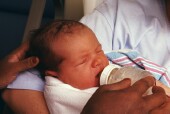 |
 |
 |

Early HIV Treatment Best for Babies
It saves lives and slows the progression of AIDS, study confirms|
|
HealthDay
Wednesday, November 19, 2008
 WEDNESDAY, Nov. 19 (HealthDay News) -- A new study finalizes research that changed guidelines around the world regarding when HIV-infected babies should begin drug therapy.
WEDNESDAY, Nov. 19 (HealthDay News) -- A new study finalizes research that changed guidelines around the world regarding when HIV-infected babies should begin drug therapy.
Based on preliminary findings released last year, several health agencies like the World Health Organization now advise doctors to begin HIV treatment early in babies, instead of waiting because of fear that the medications will do more harm than good.
"Given good health care, these babies can survive and grow up to become parents themselves," said study lead author Avy Violari, who directs pediatric clinical research at the University of Witwatersrand's Perinatal HIV Research Unit in Johannesburg, South Africa.
HIV, the virus that causes AIDS, remains a major health problem for babies worldwide, with an estimated 500,000 HIV-infected infants born in 2006.
In 2007, researchers assigned 377 HIV-positive infants in South Africa to one of three different HIV treatments. The babies, aged 6 to 12 weeks, began either immediate drug therapy for 40 or 96 weeks, or weren't given medication until symptoms appeared.
The researchers stopped the trial in 2007, because survival rates were greatly improved among those children who received early treatment. Infant mortality was reduced by 76 percent, and HIV progression by 75 percent, the study said.
Death rates among those who got early treatment were similar to those among infants who weren't HIV-infected, said study co-author Dr. Diana Gibb, a professor of epidemiology at the MRC Clinical Trials Unit in London.
After the trial was stopped, those babies assigned to receive delayed treatment got early treatment instead.
The initial findings were released in July 2007. The study confirming those findings was published in the Nov. 20 issue of the New England Journal of Medicine.
Violari said HIV-infected babies are at higher risk of dying even if they show no symptoms of infection. And laboratory tests don't do a good job of predicting who will end up getting sick, Violari said.
"Young infants are very different than adults or even children in their immune function and in their susceptibility to other dangerous illnesses," Violari said. "That is why they need treatment immediately once diagnosed."
Early treatment not only combats HIV sooner, it has other positive effects, Violari said. "Early treatment protects the brain from HIV, so not only do they survive, but they are likely to have less developmental problems than other babies who didn't get early treatment," Violari said.
Still, early treatment isn't a cure for the epidemic of HIV among babies in developing countries. "It will be much easier to implement these findings in the West, where few babies are HIV infected," Violari said. "In many developing countries, many infants are not identified early enough or are identified too late or die before they even had an HIV test."
HealthDay
Copyright (c) 2008 ScoutNews, LLC. All rights reserved.
Related News:
More News on this Date
Related MedlinePlus Pages:
| Home | Health Topics | Drugs & Supplements | Encyclopedia | Dictionary | News | Directories | Other Resources | |
| Disclaimers | Copyright | Privacy | Accessibility | Quality Guidelines U.S. National Library of Medicine, 8600 Rockville Pike, Bethesda, MD 20894 National Institutes of Health | Department of Health & Human Services |
Date last updated: 20 November 2008 |




